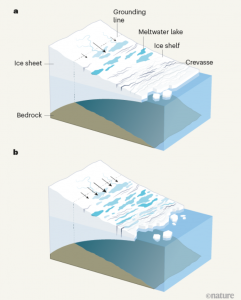
In this post, you will learn about usage of machine learning for predicting ice shelves vulnerability. Before getting into the details, lets understand what is ice shelves vulnerability and how it is impacting global warming / climate change.
What are ice shelves?
Ice shelves are permanent floating sheets of ice that connect to a landmass. Most of the world’s ice shelves hug the coast of Antarctica. Ice from enormous ice sheets slowly oozes into the sea through glaciers and ice streams. If the ocean is cold enough, that newly arrived ice doesn’t melt right away. Instead it may float on the surface and grow larger as glacial ice behind it continues to flow into the sea. This is how ice shelves form.
Are ice shelves dangerous and threat to environment?
Until ice shelves remain as permanent floating sheets of ice in the ocean, they are of no harm. However, in case the ice shelves disintegrates or collapse, this could contribute to sea level rise indirectly. The impact of ice shelves disintegration is atmospheric and oceanic warming. And, why would ice shelves collapse. This could be primarily because of global warming as a result of climate change. For an instance, in 2002, a large part of the Larsen B ice shelf — one of the freely floating platforms of ice that surround the Antarctic ice sheet — disintegrated in less than six weeks. This allowed the glaciers that previously fed it to flow more quickly to the ocean.
How could machine learning help?
Here is problem statement:
- Which is the next ice shelf to disintegrate? Rather, which portions of an ice shelf are most vulnerable to break-up?
- How would the disintegration of a particular ice shelf contribute to the discharge of grounded ice to the ocean?
One can train a bunch of machine learning models and use their predictions to simulate the retreat and disintegration of ice shelves in response to atmospheric warming. Read greater details on this Crevasse analysis reveals vulnerability of ice shelves to global warming (nature.com).
- The Watermelon Effect: When Green Metrics Lie - January 25, 2026
- Coefficient of Variation in Regression Modelling: Example - November 9, 2025
- Chunking Strategies for RAG with Examples - November 2, 2025

I found it very helpful. However the differences are not too understandable for me